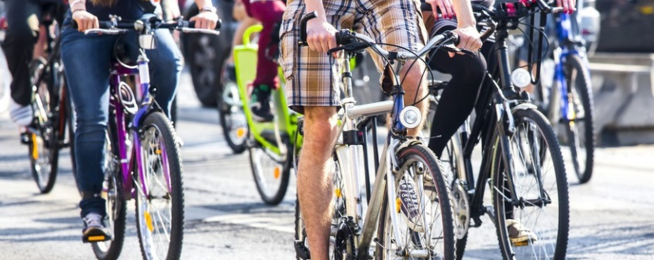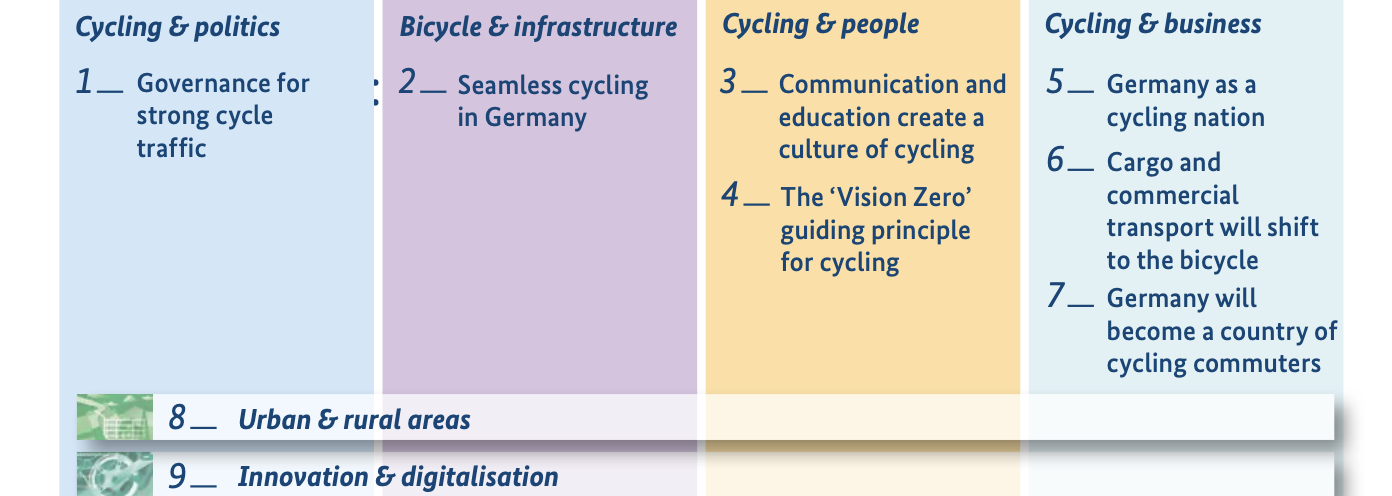After looking at some 2000 different ideas, Germany has adopted “seamless cycling networks" as the guiding principle of the nation’s new 2030 national bike plan.
If the infrastructure is inviting, public spaces are liveable, there is a relaxed co-existence in traffic, and there is a political openness towards cycling, the plan foresees that bikes, e-bikes and cargo bikes will become "a matter of course" in everyday private and business travel.
The plan expects that the number of trips per person will increase from 120 per year to 180 per year. As well, the average distance of the trip will increase from 3.7 km to 6 km.
The plan is available in English.
There are a number of key steps to realise the plan:
- Government policy that is open to cycling and promotes it consistently and actively across all disciplines;
- Well-planned and built cycling infrastructure throughout the country;
- People who enjoy using the bike safely and with enthusiasm;
- Safety via Vision Zero;
- A steadily growing and innovative cycling economy and a commercial transport sector that relies more on cycling, as well as employers who make cycling the mode of choice for their employees/for business trips;
- All aspects concern both urban and rural areas with different emphases;
- The use of modern technologies and digital solutions that can create good framework conditions for sustainable and interconnected cycling.
A remarkable feature of the German plan is the emphasis on governance, and the intention to make political culture as much a part of the forthcoming change as issues such as hard infrastructure.
"What is needed is a political and social paradigm shift in order to ensure that the number of kilometres travelled by bicycle in Germany more than doubles by 2030 compared to 2017,” the plan states. "Essential prerequisites are a modern legal framework that allows active promotion of cycling and sufficient funding.”
"Sustainable mobility must be lived and begins in the minds of decision-makers. The NCP 3.0 supports them in rethinking transport policy and in planning a new and integrated approach across disciplines, in expanding education and training and in making intensive use of networks for exchanging experience.
"A clear course needs to be set so that the mobility trend brought about by the pandemic will continue and the bicycle can be strengthened as a crisis-resistant means of transport.”
The plan says that the nationwide development of attractive cycling infrastructure that is understandable to everybody is crucial for more, better and safer cycling.
"Seamless and safe cycling networks are made up of several infrastructure elements, ranging from fast cycle connections even over longer distances, for instance, for commuters, to safe junctions and cycle lanes right through to well-designed cycle lanes in the secondary network for pleasant and safe cycling.
"Easily accessible and high-quality parking facilities must be provided at public transport interchange points and at places like schools, colleges, administrations, businesses and retail locations.”
The plan says it is particularly important to motivate children and young people to cycle. "This lays the foundation for more sustainable mobility in adulthood, and the bicycle becomes part of everyday life throughout all phases of life.”
The bicycle will become the mode of transport of choice for many employees, students and pupils, both on short and long commutes as the only mode of transport or in combination with public transport. "Cycle expressways, well-developed rapid cycle links, cycle priority routes and direct-route cycle lanes will ensure quick and safe commuting for cyclists.”
Rural areas will also benefit from the cycling boom. "The use of bicycles will increase strongly in everyday life and leisure: Mobility as well as urban development and (local) supply networks will be designed and planned in an integrated way. Seamless cycling networks will be created. Appropriate cooperation and organisational structures will be established."



